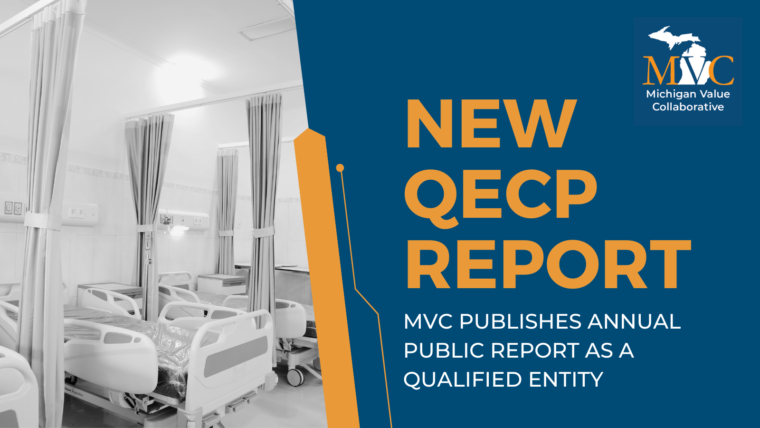Recently, the MVC Coordinating Center published its annual Qualified Entity Certification Program (QECP) public report for 2024. This report [PDF] was published in a new QECP section on the MVC website’s Data/Registry page and is an annual requirement for MVC as a qualified entity with the Centers for Medicare & Medicaid Services (CMS). This was MVC’s third public QECP report and continued to provide unidentified aggregated data about Michigan hospital performance on two measures: rates of 30-day rehospitalizations following start of home health care, and rates of outpatient follow-up received after hospitalization for congestive heart failure (CHF) or chronic obstructive pulmonary disease (COPD).
All measures in the report were created using data from MVC claims-based episodes of care initialized by inpatient hospitalizations or surgeries between Jan. 1, 2018 and Dec. 31, 2022. Claims were incorporated from all MVC payer sources, including Medicare Fee-for-Service, Blue Cross Blue Shield of Michigan, Blue Care Network, and Michigan Medicaid.
The reported overall rate of 30-day unplanned rehospitalizations after the start of post-acute home health care among episodes beginning at MVC hospitals in Michigan was 11.6% for 2018-2022. Risk-adjusted rates by index hospital ranged from 2.5% to 17.2%. By home health provider, risk-adjusted rates ranged from 0.0% to 23.5% (Figure 1). Patients whose episode of care began with an index event for endocarditis, COPD, CHF, or percutaneous coronary intervention (PCI) were more likely than patients with other index conditions to experience an unplanned rehospitalization in the 30 days after they started home health care. Patients with a joint replacement episode of care were least likely to have an unplanned rehospitalization following the start of home health care.
Results for the outpatient follow-up metrics remained similar to findings from previous annual reports. Across episodes of care for index events in 2018-2022 at the 106 MVC hospitals in Michigan, the unadjusted rate of patients receiving outpatient follow-up within 7 days after hospitalization for CHF was 44% (Figure 2). Following index hospitalizations for COPD, 36% of patients received outpatient follow-up within 7 days (Figure 3). For both conditions, there was wide variation across hospitals in Michigan in their 7-day follow-up rates after hospitalization, with rates ranging between less than 10% to over 60%. Rates of follow-up were fairly steady over time.
For more information and the entire set of findings we invite you to read the full 2024 report, available here.
QE certification status allows MVC to provide hospital members with additional data from Medicare Fee-for-Service (FFS) claims at a level of granularity which would not otherwise be available under standard CMS data use agreements. Reports located under the “QE Medicare” icon on the MVC registry allow hospital registry users to see unsuppressed Medicare data including case counts <11 as well as utilization rates and average payments based on case counts <11. In addition, on any QE Medicare registry report, members can click on specific data points to load a list of all episodes underlying that data point. From that episode list it is possible to view drilldown information on individual episodes to learn more about the claims and price-standardized payments comprising that episode.
Members may contact the MVC Coordinating Center by emailing Michigan-Value-Collaborative@med.umich.edu to learn more about data available through MVC’s QECP reports and to receive the forms necessary to gain access on the registry.







